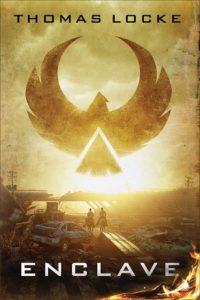As a young reader, best-selling author Davis Bunn loved classic fantasy and science fiction. Under the name Thomas Locke, he continues to pursue his passions today by writing rich, complex tales that introduce readers to new worlds. His dystopian novel Enclave (Revell) is set in a future where what was once America is now a collection of enclaves loosely run by a federal government. Twenty-one-year-old Caleb has a plan that could help secure his enclave’s future—but if his secret is uncovered, he won’t live to see another dawn. In this interview, the author shares his earliest memories of reading science fiction, reveals why his first science fiction novel should never be published, and outlines what he hopes readers learn from Enclave…
You’ve said that you always loved fantasy and science fiction. What prompted your interest in these genres?
 I loved speculative fiction from my earliest days as a reader. I can still remember the joy of having my mother take me to the city’s main adult library, where she could leave me for the best Saturday afternoons of my entire life.
I loved speculative fiction from my earliest days as a reader. I can still remember the joy of having my mother take me to the city’s main adult library, where she could leave me for the best Saturday afternoons of my entire life.
The weekend librarians all got to know me and used to joke with Mom over how I would sit utterly still with this huge pile of SF and fantasy books in front of me, going through as many as I possibly could. I would count out the minutes and rush to finish one more, because I could only take four home with me.
Four books for a week’s reading? Who were they kidding?
What was the first science fiction book you wrote?
My first science fiction story was the first book I ever wrote. It was pretty awful. I don’t remember the title. The manuscript was destroyed when flash floods inundated our cellar. All my readers should celebrate.
Your books take readers away from what they know to be true and instead help them explore the what-ifs of science fiction. How did you come up with the plot for Enclave?
I have really enjoyed some of the dystopian fiction I’ve read. But I felt like here too there could be great opportunity to insert a positive element, a heroic structure that lifted up the story—and, if we’re successful, the genre. No matter how bleak the setting, there are still opportunities for great deeds.
Who’s your favorite character in Enclave and why?
Kevin Ritter is a deputy sheriff who loses his job because he is discovered to be working for the newly reopened Underground Railroad. Only this time, they are helping refugees from northern cities seeking to relocate in Charlotte, North Carolina, where things are moderately safer.
Kevin is a brawler by nature, the son of a very wise woman who knows he needs an outlet for his strength and rage. He grows because he trusts her to make moves he might not agree with but that guide him to becoming a leader. I like Kevin a lot. I think we’d be good friends.
What do you hope readers gain from reading your book?
 There is a visceral edge to the growth in the dystopian audience. These stories have been around for ages. Kurt Vonnegut’s Slaughterhouse-Five and Ray Bradbury’s Fahrenheit 451 were two that impacted me deeply as a kid.
There is a visceral edge to the growth in the dystopian audience. These stories have been around for ages. Kurt Vonnegut’s Slaughterhouse-Five and Ray Bradbury’s Fahrenheit 451 were two that impacted me deeply as a kid.
The newer novels’ bleak hopelessness and their dire predictions nowadays represent a big change in how young people view their future. I want to address this where they live, in their chosen genre, and add a clear message that even here there is hope, if the individual accepts the challenge to grow. Even here.
Visit Thomas Locke’s author page:
https://www.familyfiction.com/authors/thomas-locke
Enclave
Thomas Locke
Revell


